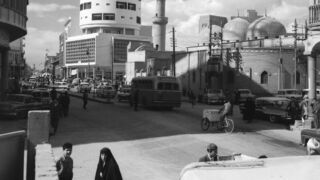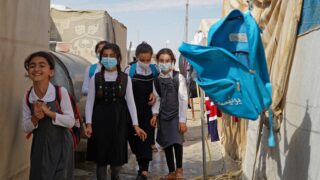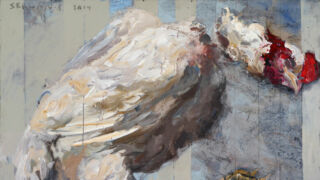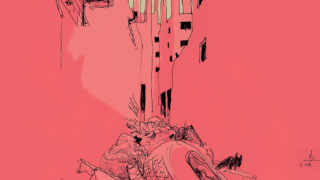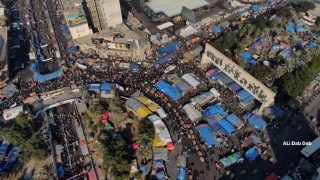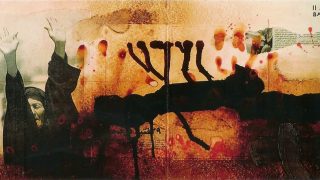Because Iraq is close to the heavens, its doors remain open to demons and angels alike. The extremely hot weather is concentrated between the Tigris and Euphrates rivers. It is said that the wings of the angel Gabriel drew the paths of these two rivers in Iraq. Furthermore, the rituals of Ramadan did not intercede this year to plead with the heavens to reduce the heat, which exceeded 50 degrees Celsius [around 120 degrees Fahrenheit].
Wet dates scorch on palm trees, before transforming into edible fruit. Streets turn into open air public baths. On every street there are dozens of water sprinklers hung from electricity poles, while people stand fully clothed under the merciful water. This is hell itself pervading the earth and waging a climate war. The number of fasting Muslims decline with each passing day of the holy month of Ramadan, as well as the number of public iftar meals. Once a distinguishing feature of the streets during Ramadan, these public meals have almost disappeared from the streets and mosques, perhaps in recognition of the small number of fasting Muslims.
The Ramadan drummer … the bloody beat
Only the drum of the Ramadan drummer is not affected by all this, as it booms loudly in the alleys at 2 am. The gifts he is expecting from the households on the first day of Eid al-Fitr and the lack of sunlight at this time of day motivate the drummer to keep up his beat and not fall behind, as he carries out his duty of waking up the fasting people throughout the neighborhoods. The zealots who call themselves the representatives of God on earth are not fond of the drummer’s persistence, making use of drums of their own: the drums of death. It seems as if they were asking with cruel defiance which of the drums are louder. In Basra, they silenced the drummer by killing him on the street. In the Aamiriya neighborhood of west Baghdad, people noticed the absence of the drummer’s beat one night, and at dawn they found him dead, lying beside his drum in a pool of his own blood. He had been shot three times by bullets fired from a pistol with a silencer.
Promises
Governmental promises are on the menu of iftar tables this year. Prime Minister Nouri al-Maliki promised the people a donation of a half-kilogram of lentils for each person. This was to be distributed during Ramadan as part of the ration card system, which lies in ashes. Moreover, the deputy prime minister for energy affairs failed to keep his promise to provide electricity, so candles illuminated these tables instead. These promises, which have yet to be fulfilled, added to the harsh living conditions of the people. Food prices increased twofold or more for some goods, while the substantial shortfall in the supply of electricity led to the increase of electricity prices from private generators.
The ring is lost
Ramadan in Iraq is characterized by the “Mheibes” — that is, the Ring Game that takes place in popular cafes, involving two teams of young men. Throughout history, this game led to the emergence of celebrity players in each region such as Jassim al-Aswad and Abbas Tineh, among others. Each team, consisting of about 50 players or more, hides the ring in the hands of one of its players, while a member of the opposing team must find the hand holding the ring. The game also includes breaks for the performance of the traditional ensemble of al-Chalgi al-Baghdadi, a well-known musical style in the city.
Meanwhile, thin pancakes and baklava are distributed to the guests — two kinds of sweets produced almost exclusively in the month of Ramadan. But these beautiful rituals were missing from Ramadan this year, since most cafes closed their doors for fear of raids by security agencies. Since the beginning of the month, several cafes in the affluent districts of Karada and Zayouna were hit by explosions and forced to close their doors by these agencies, which claimed these cafes are conducive to the spread of vice. This official closure added to the fear of explosions hitting a number of cafes. The most serious explosions were in the Aamiriya neighborhood and a cafe in the center of Kirkuk, which resulted in multiple deaths and injuries.
Finding Rahman tables
Just like the generous iftar tables stretching on sidewalks during days where Muslims flood the streets and walk long distances to visit religious shrines, one would expect the Rahman tables for iftar to be offered in the streets and mosques. Oddly, however, this practice is slowly disappearing year. Even though those in power and those disposing of public money in Iraq are Sunni and Shiite Islamist parties, such tables are rarely found.
The rumbling surrounding the resulting deaths is louder than the sound of the iftar cannon. The sanctity and the rituals of this holy month are being undermined in a country where nothing is deemed strange, aside from calmness and security.
On top of all this, this year's heat exceeded the usual July temperatures to such an extent that a Muslim cleric issued a fatwa permitting fasting Muslims to drink a specific amount of water if forced to do so, without it being considered as
having broken their fast.
Translated by Al-Monitor

